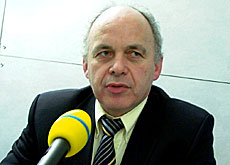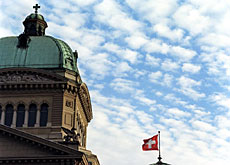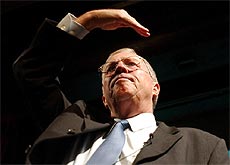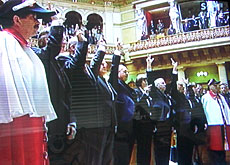Politics is a man’s world

The rightwing Swiss People’s Party is not known for dithering on controversial issues - it wants Switzerland to stay outside the European Union and women to stay inside the home.
And as party president, Ueli Maurer, made clear in an interview with swissinfo, the fact that the party is now fully represented in government changes nothing.
Five months after the People’s Party triumphed in parliamentary elections, its rhetoric has become less provocative and strident.
But that is primarily because its figurehead, Christoph Blocher, has had to toe the government line since he joined the cabinet in January.
swissinfo: Your party colleague, Christoph Blocher, has been a cabinet minister for close on 100 days. How do you judge his performance?
Ueli Maurer: One senses that something has changed in the cabinet – that there has been a breath of fresh air. The cabinet is asserting its influence – proposals that would have cost a lot money have been challenged and withdrawn – and Christoph Blocher is partly responsible for that.
swissinfo: Your party has failed to push through a key transport initiative. How do you expect to win over the political Centre?
U.M.: In this case, the Centre stuck to its position. And the cabinet is possibly driven by the ideas and policies of the centre. But in parliament, the strength of our party has brought the Left together and in the coming months we can expect close calls on several issues.
swissinfo: Do you expect to win support from the Centre parties? Or will the People’s Party have to go it alone?
U.M.: We expect some support from the Centre, particularly from the Radical Party. But both the Centre parties – the Radicals and the Christian Democrats – are absorbed with their own internal issues. They are looking for new party presidents and new policies. So we are largely on our own for the moment.
swissinfo: Why does the People’s Party resort to defamation – posters calling people “rats” and “negroes” – to get its message across, instead using convincing arguments?
U.M.: These are convincing arguments. The public is facing hefty tax increases of about SFr5 billion. There is pressure to raise VAT to 25 per cent [from 7.5 per cent today]. Such behaviour reminds one of rats, which consume everything in sight. We used these posters to draw attention to this.
swissinfo: Life in Switzerland is good. Why do we need the People’s Party?
U.M.: Life is good. But if we consider the past ten or 12 years, Switzerland has had the lowest economic growth of any industrialised nation.
This downward spiral has to be stopped. The other parties are responsible for this. We need another party, which is able to do something about it now.
swissinfo: Since the Swiss rejected membership of the European Economic Area (EEA) in 1992, growth has ground to a halt compared with our neighbours. How do you explain that?
U.M.: Joining the EEA could have exposed us to competition more quickly. But the disadvantages that would have come with membership would have doubtless been bigger.
When we look today where and why we have weak economic growth, it is clear that we all have to play a part in improving the situation. We don’t need to be members of the EU. And we do need to liberalise our domestic markets.
swissinfo: We have serious problems at the borders [since Germany imposed strict border checks three weeks ago]. Wouldn’t membership of the EU’s Schengen agreement solve this problem?
U.M.: No. In terms of security, Schengen [which governs cross-border crime] would solve nothing at all. We would be interested in exchanging information with EU states [to curb criminal activity].
But if we were to join Schengen, it would threaten our security because we would have to dispense with border controls.
swissinfo: What can a party president actually do about anything?
U.M.: I think to unite the party behind its most important goals. Today we have more divisions, and obviously there are discussions about the details, but the overall direction is clear.
I have reorganised the party in the past eight years. We have founded numerous local affiliates, and today we are the most well organised and structured party.
swissinfo: Where do you want to lead the party during the next legislative period?
U.M.: We want to carry our political objectives: lower taxes, no debt, no abuse of the asylum system, the preservation of Switzerland’s independence and freedom, and the securing of our social structures.
We will remain focused on these objectives and try to organise the party so as to achieve them. We need strong people because we are not yet present in all the places we need to be.
swissinfo: What does the future hold for the People’s Party?
U.M.: I think we have become the alternative to the Centre. At the moment, we are the party that attracts the most young people, and provided we continue to do so, we have a sound basis for success in the mid-term.
I don’t think we’ll continue to grow as we did in the past, but I imagine that in four to eight years, we will have the support of between 30 and 35 per cent of the voters [compared with 27 per cent in the 2003 parliamentary elections].
swissinfo: Since the elections, the Centre has practically disappeared. Is this where you see the People’s Party picking up votes?
U.M.: We will certainly pick up voters who are disillusioned with the Centre parties. But we won’t move the party towards the Centre simply to win more votes. We want to remain a party of the Right.
swissinfo: The People’s Party is dominated by men – in parliament you have three women and 60 men.
U.M.: We are a party of traditional conservative values. Values such as “family” matter a great deal to us. We have plenty of women voters supporting us. But their first priority is their traditional role – for example, as mothers. Only once they have fulfilled their traditional roles do they choose to become involved in politics.
This will change in the coming years, but we will certainly never be a party in which women with political mandates will gain the upper hand.
swissinfo: How important are the Swiss living abroad to you?
U.M.: Very important. We have tried to strengthen ties with the Swiss abroad. We have a strong section representing the Swiss abroad with the status of a cantonal party. And we have supporters among the Swiss abroad who vote for us.
We are in the process of widening the net, and we are trying to use the internet to inform the Swiss abroad about what is happening in Switzerland and especially about the goals of the People’s Party. But we are at the beginning of this process.
swissinfo-interview: Christian Rauflaub
The Swiss People’s Party won the largest share of votes (26.6%) in October’s parliamentary elections.
The party was given a second cabinet seat at the expense of the Christian Democrats in Switzerland’s seven member cabinet which shares power among four parties.
Its figurehead, Christoph Blocher, became justice minister in January, shifting the balance of power to the Right.
In eight years, the party has gone from being the smallest of the four in government to the largest.

In compliance with the JTI standards
More: SWI swissinfo.ch certified by the Journalism Trust Initiative



You can find an overview of ongoing debates with our journalists here. Please join us!
If you want to start a conversation about a topic raised in this article or want to report factual errors, email us at english@swissinfo.ch.